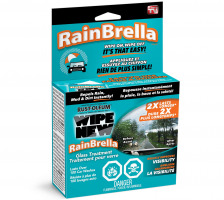
— Most of a RainBrella glass treatment class action lawsuit has been dismissed after a customer claimed statements about RainBrella on the packaging were false.
RainBrella is a glass treatment sold by Rust-Oleum in a box containing two saturated cloth wipes to repel rain, mud and dirt.
In a separate July 2017 action, Illinois Tool Works (ITW), which manufactures a similar water repellent product called Rain-X, filed a lawsuit against Rust-Oleum alleging RainBrella’s representations were false and misleading.
After a six-day jury trial in 2018, the jury found Rust-Oleum was liable for false advertising based on the claim that RainBrella “Lasts 2X Longer” than the leading competitor and liable for misleading advertising based on the claim RainBrella “Lasts Over 100 Car Washes.”
While the Fifth Circuit upheld the jury’s verdict relating to the “Lasts 2X Longer” representations, the court reversed the verdict relating to the “Lasts Over 100 Car Washes” representation, holding there was no evidence to support a finding of materiality.
The trial court then issued a judgment to stop Rust-Oleum from using the claim “Lasts 2X Longer” and making representations as to RainBrella’s performance as compared to Rain-X.
Wisconsin plaintiff Shaquavia Harris sued Rust-Oleum Corporation alleging she fell for advertising that said the glass treatment “Lasts 2X Longer” than a leading competitor and “Lasts Over 100 Car Washes.”
The plaintiff and her husband regularly purchased RainBrella for years and applied it to their vehicles, typically paying about $7.99 per box.
According to Harris, even though she continued to purchase and use the product for years, she never would have purchased RainBrella had she known the statements about RainBrella on the packaging were false.
Motion to Dismiss the RainBrella Lawsuit
Rust-Oleum filed its motion to dismiss and succeeded in getting all the claims dismissed except one count.
The plaintiff alleged an unjust enrichment claim against Rust-Oleum, but the company argued the plaintiff didn't purchase RainBrella direct from Rust-Oleum and instead bought it from retailers.
According to the judge, Wisconsin law is strict about the first element of an unjust enrichment claim as it requires, “[t]he conferral of the benefit must be directly from the plaintiff to the defendant and not, for instance, a third-party retailer.”
Therefore, Judge Andrea R. Wood dismissed the claim because Harris alleges she purchased RainBrella from third-party retailers but not from Rust-Oleum.
Rust-Oleum also said the plaintiff couldn't proceed with her nationwide class action lawsuit because it would involve unjust enrichment claims of all 50 states. The judge agreed and said applying laws of all 50 states is "unmanageable on a class-wide basis because those states’ laws conflict in material ways."
Additionally, the judge ruled the one named plaintiff (Harris) is an inadequate class action representative.
The judge also dismissed a declaratory judgment claim that RainBrella is defective because the plaintiff has no basis to seek declaratory relief pursuant to federal rules for a nationwide class of customers.
Judge Wood further dismissed a claim for breach of implied warranty of merchantability because “Wisconsin has always required privity of contract in an action for a breach of implied warranty.”
"For consumer transactions, privity exists only between the buyer and immediate seller—accordingly, there can be no claim for an implied warranty of merchantability between a manufacturer and consumer without a direct sale." — Judge Wood
The only claim allowed to proceed is a Deceptive Trade Practices Act claim because the judge found dismissal at this point would be "premature."
The RainBrella glass treatment class action lawsuit was filed in the U.S. District Court for the Northern District of Illinois, Eastern Division: Shaquavia Harris, v. Rust-Oleum Corporation.
The plaintiff is represented by Simmons Hanly Conroy LLC, Williams Dirks Dameron LLC, and The Goss Law Firm, P.C.




